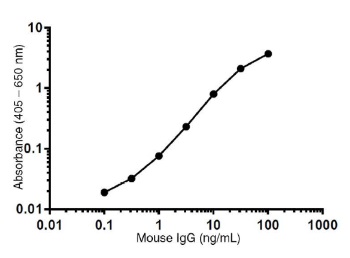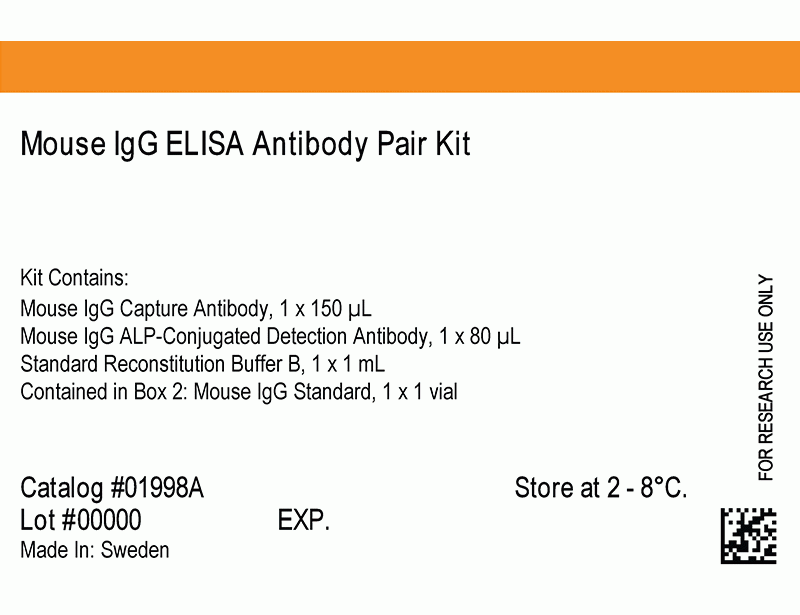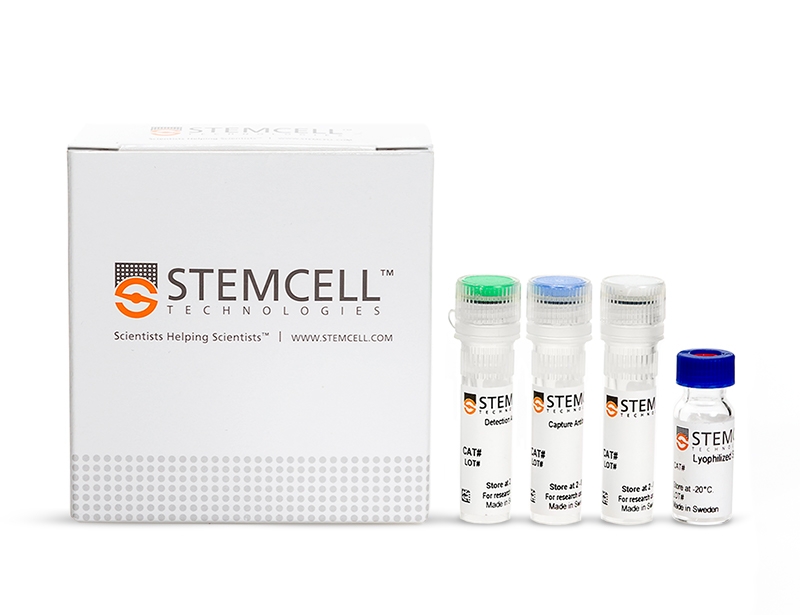概要
The Mouse Immunoglobulin G (IgG) ELISA Antibody Pair Kit is intended for those who want the flexibility of setting up their own ELISA assay. This kit includes capture and detection antibodies and an IgG standard. It is designed for the quantitative detection and measurement of total mouse IgG in biological fluids such as serum, plasma, and cell culture supernatants. IgG is the major immunoglobulin found in blood, lymph fluid, cerebrospinal fluid, and peritoneal fluid. IgG plays a key role in the humoral immune response, plays a critical step in the opsonization process by interacting with the Fcγ receptor on macrophages, neutrophils, and natural killer cells, and is able to activate the complement system. IgG is the most abundant immunoglobulin in serum, comprising approximately 80% of all serum immunoglobulins.
The assay is based on the sandwich ELISA method, in which samples are added to ELISA plates coated with capture antibodies specific for the immunoglobulin. The captured immunoglobulin is detected by addition of a detection antibody conjugated to alkaline phosphatase (ALP). Addition of the chromogenic enzyme substrate p-nitrophenyl phosphate (pNPP) results in a colored product with an intensity directly proportional to the concentration of immunoglobulin in the sample. The concentration of the immunoglobulin is determined by comparison to a serial dilution of the immunoglobulin standard analyzed in parallel.
NOTE: This kit includes sufficient reagents for 6 x 96-well ELISA plates (Catalog #38019). ELISA plates and pNPP Substrate (Catalog #01917) are required for use with the Mouse IgG ELISA Antibody Pair Kit and are available for purchase separately.
The assay is based on the sandwich ELISA method, in which samples are added to ELISA plates coated with capture antibodies specific for the immunoglobulin. The captured immunoglobulin is detected by addition of a detection antibody conjugated to alkaline phosphatase (ALP). Addition of the chromogenic enzyme substrate p-nitrophenyl phosphate (pNPP) results in a colored product with an intensity directly proportional to the concentration of immunoglobulin in the sample. The concentration of the immunoglobulin is determined by comparison to a serial dilution of the immunoglobulin standard analyzed in parallel.
NOTE: This kit includes sufficient reagents for 6 x 96-well ELISA plates (Catalog #38019). ELISA plates and pNPP Substrate (Catalog #01917) are required for use with the Mouse IgG ELISA Antibody Pair Kit and are available for purchase separately.
技术资料
| Document Type | 产品名称 | Catalog # | Lot # | 语言 |
|---|---|---|---|---|
| Product Information Sheet | Mouse IgG ELISA Antibody Pair Kit | 01998 | All | English |
| Safety Data Sheet 1 | Mouse IgG ELISA Antibody Pair Kit | 01998 | All | English |
| Safety Data Sheet 2 | Mouse IgG ELISA Antibody Pair Kit | 01998 | All | English |
| Safety Data Sheet 3 | Mouse IgG ELISA Antibody Pair Kit | 01998 | All | English |
| Safety Data Sheet 4 | Mouse IgG ELISA Antibody Pair Kit | 01998 | All | English |
数据及文献
Data

Representative Standard Curve
• Reportable Range: 0.1 - 100 ng/mL. This is the concentration range in which measurement of the analyte can be done with the highest precision, accuracy, and linearity.
• Accuracy: No international standard exists for calibration.

 网站首页
网站首页



